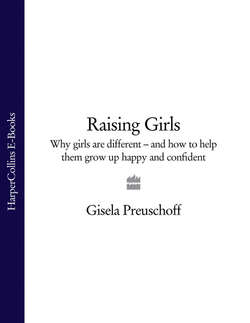Читать книгу Raising Girls: Why girls are different – and how to help them grow up happy and confident - Gisela Preuschoff - Страница 26
Eating with pleasure
ОглавлениеEating often becomes a tricky family issue. That’s why I think it’s important to give young parents hints on it.
Isn’t it remarkable, in the truest sense of the word, that in our muddle-headed, mechanised world, it is our natural needs – such as eating, sleeping and sexuality – that give us so much trouble? Shouldn’t it make us stop and think when, in a world of such surplus, so many people have an unhealthy diet and suffer from vitamin and mineral deficiencies? And why is it almost always girls who have eating disorders and are dissatisfied with their bodies in puberty? How does this all start – and how can we as parents stand by our daughters and help them?
The best nourishment in the first few months of any child’s life is mother’s milk. It is the food that was designed for us, and there is no equal alternative. From about the sixth month, children should also start eating some solids – carrot purée, for example. Then, once your child can sit in her own high chair with you at the table, you should start thinking about joint meals.
An important part of the ‘culture’ of every family is food – who cooks when, and with what ingredients. Of course you will have your own thoughts about this, but for the sake of the health of your child(ren), a couple of points are worth bearing in mind. Processed baby food cannot compete with freshly cooked vegetables in terms of nutrients – but then again, not all fresh vegetables are equally nutritious. Do you know if organic veggies are available close to where you live? Have you considered buying them? What about organic meat, and free-range eggs? Freshly prepared cereal, vegetables and fruit are the best food you can offer your child. Organic foods like these are grown naturally, free of chemicals and pesticides – whose long-term side effects are still not fully known – as well as genetic modification. This is the way the earth intended us to enjoy its produce. If, from the beginning, you avoid giving your daughter sugar (in the form of lollies, biscuits or fizzy drinks, for instance), you’ll be doing a lot for her nutrition – and her teeth.
Moreover, this way you’ll have your child eating almost everything you offer her. If she doesn’t like a certain type of vegetable, don’t be concerned. As long as your daughter hasn’t got to know sugar and other processed foods (see below), she will choose what she needs out of the range of things you offer her. And remember, a healthy child also helps make her parents happy!
